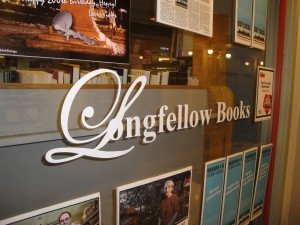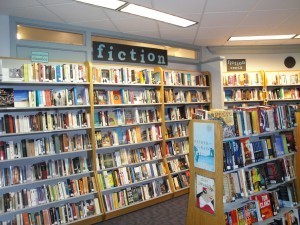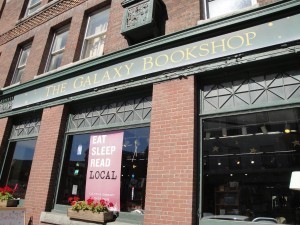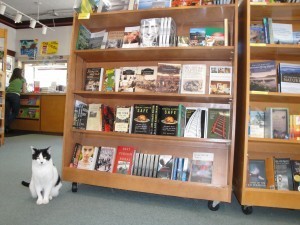Midge Raymond's Blog, page 41
January 25, 2012
Bookstore Geek: Hammond's Books
Hammond's Books is one of those amazing discoveries you may make only when wandering the streets. I found this fantastic little bookstore while antiquing in St. Louis's Cherokee neighborhood.

Part of the Cherokee-Lemp Historic District, Hammond's Books is brimming with books and antiques — with a wonderful collection of used, rare, collectible, and out-of-print books — and it has the same fabulous stepped-int0-the-past feel as the rest of the neighborhood.
Hammond's offers three floors of book browsing, and there's espresso and cappuccino available if you need a little caffeine after winding your way through all the narrow aisles and chandelier-lit nooks.
And after shopping at Hammond's, as long as you're on Cherokee, save some time for browsing the other eclectic antique stores, where you'll find plenty of wonderful, dusty old books. And, if you're into beer (as my companion happened to be), check out the Lemp brewery — a stunning building that fortunately was preserved after Prohibition put the brewery itself out of business.

January 23, 2012
Weekly Writing: Rumors
For writers, rumors provide fantastic material — in fact, the weirder and more outlandish they are, the better. As writers, we don't care whether the rumor about a long-lost classmate's love child is actually true; we're just fascinated by the possibility that it might be because there's a story there.
Whether a rumor is about a tornado warning, a sneaky colleague, or a relative having an affair, hearing such things perks us up, makes us pay attention. It teaches us to be alert, a state we should always be in as writers. Keep this in mind as you enjoy this week's prompt:
Write about a rumor you heard. Try to write out several scenes, using these details: who started it, who is spreading it, who the rumor is about; write around the rumor itself, exploring instead the reasons it came into being.
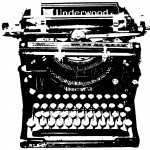

January 16, 2012
Weekly Writing: Art
It's always fun to visit a museum, particularly with family or friends — I'm curious to see which pieces draw us in, which paintings or sculptures one person admires while the other rolls her eyes. Today, think about art — your own preferences or that of one of your characters.
Write about a favorite painting. Go into great detail visually; if you can, include background on the artist, including when and where he/she created the work.


January 9, 2012
Weekly Writing: Sunday mornings
This weekend it occurred to me how much my Sunday morning rituals have changed over the years. Instead of having every surface of my apartment covered by some section of the Sunday New York Times, for example, I read it tidily online. I no longer have omelets but tofu scrambles. Instead of donning running shoes to explore a new neighborhood of whatever city I live in, I'm now putting on hiking boots and heading into the woods.
Write about what you did this past Sunday morning. Then, write about what you did on a typical Sunday morning five years ago, then ten years ago, then fifteen, and so on. To flesh out this exercise, fill it in with two- and three-year intervals as well. Write about how things have changed, and why.


December 28, 2011
Writing tips for a new year…
With another new year is ahead, my new list of writing goals now reads: Writing Goals of 2011 2012.
Sometimes we don't accomplish everything we hope to — but that doesn't mean we can't re-evaluate and move on. So I thought I'd offer a few writing tips as we head into 2012 (though I admit I probably need them more than you do).
It wasn't even two years ago that I discovered Priscilla Long's List of Works, and I still find that it's among the best tools I have for keeping track of what I'm doing (or not doing) as a writer. In brief, a List of Works allows you to note what projects you've begun (and when), at what stage they are (published or circulating), and what you need to revise, finish, and/or send out.
In all, it's been a great year. Forgetting English, which went briefly out of print last year, has a fabulous new life thanks to Kevin Morgan Watson and Press 53. I did a book tour with my dear friend and writing buddy Wendy Call, the award-winning author of No Word for Welcome. I published five stories, won a fiction contest, and was nominated for a Pushcart Prize.
Then, of course, there's the rest of it. I also have three unfinished stories (two of which I began back in 2010), and a half-dozen ideas for stories that are still waiting for attention (and again, some of these ideas have been sitting there, half-baked, for at least a year…or more). I have half of a new story collection that I'd hoped to finish this year (definitely not going to happen). And then there's that novel I've been working on for the past two years.
But this is what it's all about: accepting both the good and the less-than-good. Finding the balance. Celebrating the great news and resolving to make great news from the rest…eventually.
So if you're like me — juggling storylines and submissions — here are a few tips for 2012…
- Create a List of Works. Whether you're just beginning to write or whether you've been writing for years, you should have a List of Works. Create it in whatever way works for you … just make sure you write down every single project you begin, and be sure you create one for every calendar year. Most important, go back through your ancient files and list every writing project you've ever begun…you never know what might happen when you rediscover these "old" ideas.
- Take a close look at unfinished projects. I've found many a gem in a long-abandoned project. Even when I have only a vague idea for a story, I'll jot down a few notes, file it as a "story in progress," come back to it at least once a year. Often it just sits there for another year, but sometimes I'll find it at just the right time, and it'll come to life in new and surprising ways. Never abandon old ideas; you never know when they'll suddenly be relevant.
- Track all your submissions. This may seem incredibly obvious, but I'm always surprised by how many writers don't keep track of submissions. Thanks to many magazines and publishers accepting online submissions, it's easier now than ever — but you'll still want to have some sort of system for whatever you submit in print. I use an Excel spreadsheet; one writer I know keeps a loose-leaf binder; other writers keep simple lists. It's helpful for many reasons (among them, making sure you don't submit the same piece to the same publication twice, or forget what you sent when a form rejection arrives) — but most of all, it'll remind you to keep sending work out there. It can take dozens of rejections before you get an acceptance, and you'll want to be sure you keep your work circulating.
- Take stock of your progress at least twice a year. And quarterly is even better. Taking inventory will help you see what you've begun and how far you've come — and how far you still need to go. And keep in mind this isn't meant to stress you out about what you're not writing but to inspire you to stay on course. You may find that you haven't gotten anywhere with the novel you'd hoped to write but that you found the perfect ending for a short story you've been working on for years. Or you may find that the poem you started isn't coming together but that it would make a better personal essay anyway. Be open to taking things in new directions.
- See how you can use your new work to better promote the work that's already out there. When Forgetting English was reissued by Press 53 in April of this year, it was in an expanded version with two new stories. One of the stories, "Lost Art," hadn't yet appeared outside the collection, so I thought it would be great to find it a home of its own, which would in turn help promote the new edition of my book. I found the story a home in a beautiful online journal, Escape Into Life, and it was a win-win all around. (Note that you may need to check your publishing contract before embarking on such a venture.) I've also done guest blogs and articles for The Writer about various aspects of my writing process, all of which bring new attention to Forgetting English. Think about how you can use what you know and do best to highlight your own work.
Happy new year! May 2012 be your best writing year ever.

December 19, 2011
Weekly Writing: Pet Peeves
There are certain things that annoy us all — leaf blowers at eight o'clock on a Saturday morning, for example, or typos on billboards — and, naturally, what annoys us can also reveal quite a lot about us…just as pet peeves can reveal so much about our characters.
Write about your (or your main character's) top three pet peeves. Then write about why and how it came about, i.e., what might be the origin of these particular peeves?


December 16, 2011
Bookstore Geek: Longfellow Books
Maine has a treasure in Longfellow Books, which is in the heart of downtown Portland and an amazing place to browse.
The store doesn't simply host author events; it hosts parties, and it treats each customer like a cherished guest. Wine is served, along with homemade cookies baked and delivered by a local bookstore supporter who tailors each recipe to the event (for Wendy Call's recent event for her book No Word for Welcome, centered around the Mexican Isthmus of Tehuantepec, the cookies were baked with Mexican spices).
And in a lovely gesture, for this year's Take Your Child to a Bookstore Day, Longfellow Books gave every child child a free book up to a $10 value or the same amount off their purchase, donating 356 free books by the day's end.
So don't miss Longfellow Books the next time you're in Portland. The store offers used as well as new books, and will buy yours as well. It also offers, in true indie fashion, "parking, gift wrapping, advice, dog biscuits, and a wealth of knowledge about books." It's well worth an extended visit — and try to make it to an event if you can.

December 13, 2011
Book Promo 101: The non-reading book tour
When my writing buddy Wendy Call and I began to plan our joint book tour for this past summer and fall, we proposed events from readings to workshops to writing-prompt sessions. And, as this Wall St. Journal article indicates, we are apparently not alone in thinking outside the traditional book tour. In fact, of the nearly dozen events Wendy and I did together, only two of them were straight readings.
We took this approach for several reasons: For one, we are two writers with quite different books that are very similar in theme; our books cover travel, globalization, and characters facing challenges, yet Wendy's book, No Word for Welcome, is nonfiction, while Forgetting English is a collection of short fiction. So we wanted to bring readers together to offer something for both nonfiction and fiction readers, as well as to give them a chance to participate as an audience.
We also recognized that neither of us is (quite) famous enough to have fans lining up around the block. And when you are an unknown author, it helps to offer a little something beyond the book when you're meeting your readers, most of whom will be new.
Finally, we planned to visit a variety of venues, from Grub Street to The Writer's Center to Boston University, as well as bookstores. And we also recognized that a bookstore event needs to draw crowds and sell books to be a win-win, and it's up to the author as well as the bookstore to try to make that happen.
We learned a great deal — far more than will fit into a short blog post — but here are a few tips…
- Team up. There are so many advantages to doing a joint book tour — and offering a little something different to participants is only one of them. And, as this WSJ article mentions, sometimes a bookseller will interview an author, which is another great idea.
- Offer a workshop. Wendy and I taught several different workshops on our tour, all geared toward the themes in our books, from narrative writing to travel writing. Though we each chose sections of our books for the other to read, we also offered examples of work other than our own and included handouts and reading lists. You can also, as Wendy did at several of her solo events, offer slide shows with images that relate to your book; many authors use PowerPoint presentations as well. There are really no rules other than making the presentation engaging and relevant.
- Talk about what inspired the book or certain scenes. It's always fun to learn what's behind the scenes of an interesting book, and by going this, you offer readers more than what's between the pages. You'll want to read enough to give readers a taste of what's to come — but the idea is that they'll be buying the book, so you'll want to offer something they can't take home with them.
- Make time for audience participation, whether you assign a couple of writing prompts or start the Q&A with you asking the Qs. As novelist Jason Skipper says in this interview, on his recent book tour he took several fun approaches to his readings, from singing Wilco songs to inviting the audience to read with him.
- Structure the event so that reading time is minimal. While Wendy and I both made time to read brief excerpts from our respective works (you definitely want to give people at least a little taste of your book), we spent only a small percentage of our event time on reading, which allowed for us to get to know our audiences and vice versa. We'd often begin with a brief reading and then conclude with one as well — this is a good way to bookend an event — but for the most part, while we were there on behalf of our books, we talked more than read.
In the end, the most important thing is that you have fun — this is something that readers will remember — and often the most fun and surprising events go well beyond the book itself.

December 12, 2011
Weekly Writing: Punctuation
Every writer has certain language and punctuation tics, which we either embrace or overcome, depending on how well they work (or don't) for us. My particular punctuation tic is the em dash — I love it and overuse it to death. If I go back and revise, omitting 50 percent of the em dashes in a story, it's still pretty riddled with them. Still, I can't get rid of them completely — I love how em dashes add emphasis, set phrases apart, offer a little sense of something more interesting to come than a mere comma or semicolon would indicate.
What's your favorite (and/or most overused) punctuation mark? Why do you like it, i.e., what do you think it offers to a sentence than another mark can't? Give it a bit of personality, and see where this takes you.


December 7, 2011
Bookstore Geek: The Galaxy Bookshop
It's not easy to get to Hardwick, Vermont, but it's a town known to many thanks in part to the book The Town That Food Saved: How One Community Found Vitality in Local Food … And if you're ever in Hardwick, be sure to stop into The Galaxy Bookshop.
… And if you're ever in Hardwick, be sure to stop into The Galaxy Bookshop.
Galaxy is located in what used to be a former bank building — there's a selection of children's books in what used to be the bank's vault — and it's home to two sweet bookstore cats.
As Shelf Awareness has just reported, Galaxy is actually about to move to a new location, where it'll have better foot traffic and a more suitable space for its inventory, among which you'll find a large selection of children's books, cookbooks, maps, journals, notecards by local artists, and a whole shelf of books by indie authors. It's very happy news that Galaxy will live on after twenty-three years in Harwick.




